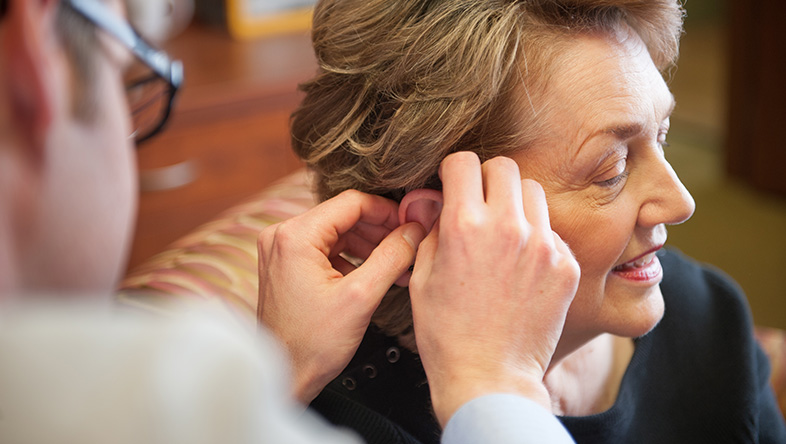
Hearing Aids May Protect Against Risk of Dementia Associated with Hearing Loss, Study Finds
New study published in 'The Lancet' shows that wearing hearing aids decreases your risk of developing dementia or Alzheimer's disease to essentially the same level as a person with normal hearing.
Hearing aids can protect people from the risk of developing dementia associated with hearing loss, including Alzheimer's disease, according to a new study published in the medical journal The Lancet.
Two previous landmark studies published by the Lancet Commission in 2017 and 2020 showed that hearing loss is the number-one “modifiable risk factor” in middle-life, linked to around 8% of worldwide dementia cases. Therefore, addressing hearing loss could be a crucial way to reduce the global burden of dementia—a disorder currently suffered by more than 55 million people worldwide at a cost of $1.3 trillion. However, until now, most evidence for the preventative effects of hearing aids has been indirect or involved smaller study populations.
The new study by an international team of researchers shows that people experiencing hearing loss who are not using a hearing aid may have a higher risk of dementia than people without hearing loss; however, using a hearing aid may reduce this risk to the same level as people without hearing loss. The study analyzed 437,704 people in the UK Biobank ages 40-69 between 2006-2010. The average age of study participants at recruitment was 56 years old, and the average follow-up time was 12 years.
Around three-quarters of the participants had no hearing loss, and the remaining one-quarter had some hearing loss. Among those with hearing loss, 11.7% used hearing aids, say the researchers. After controlling for other factors, the study suggests that, compared to participants with normal hearing, people with hearing loss not using hearing aids had a 42% higher risk of all-cause dementia, while no increased risk was found in people with hearing loss who used hearing aids.
This is approximately equivalent to a 1.7% risk of dementia in people with hearing loss who are not using hearing aids, compared to 1.2% among those without hearing loss or who are experiencing hearing loss but using hearing aids. The positive association of hearing aid use was observed in all-cause dementia and cause-specific dementia subtypes, including Alzheimer's disease, vascular dementia, and non-Alzheimer's disease non-vascular dementia.
“The evidence is building that hearing loss may be the most impactful modifiable risk factor for dementia in mid-life, but the effectiveness of hearing aid use on reducing the risk of dementia in the real world has remained unclear,” said corresponding author Prof. Dongshan Zhu, Shandong University (China) in a press statement. “Our study provides the best evidence to date to suggest that hearing aids could be a minimally invasive, cost-effective treatment to mitigate the potential impact of hearing loss on dementia.”
“Close to four-fifths of people experiencing hearing loss do not use hearing aids in the UK,” says Dongshan Zhu. “Hearing loss may begin early in one’s 40s, and there is evidence that gradual cognitive decline before a dementia diagnosis can last 20 to 25 years. Our findings highlight the urgent need for the early introduction of hearing aids when someone starts to experience hearing impairment. A group effort from across society is necessary, including raising awareness of hearing loss and the potential links with dementia, increasing accessibility to hearing aids by reducing cost, and providing more support for primary care workers to screen for hearing impairment, raise awareness, and deliver treatment such as fitting hearing aids.”
The researchers also analyzed how other factors, including loneliness, social isolation, and depressive symptoms, might impact the association between hearing loss and dementia. The study analysis suggests that less than 8% of the association between hearing aid use and decreased dementia risk could be removed by improving psychosocial problems. The authors say this indicates the association between hearing aid use and protection from increased dementia is likely primarily due to direct effects from hearing aids rather than the investigated indirect causes.
“The underlying pathways which may link hearing aid use and reduced dementia risk are unclear. Further research is needed to establish a causal relationship and the presence of underlying pathways,” says study coauthor Dr. Fan Jiang, Shandong University (China).
The authors acknowledge some limitations to the study, including that self-reporting is at risk of bias and that, as this study is observational, the association between hearing loss and dementia might be due to reverse causation through neurodegeneration or other shared mechanisms. Additionally, although many cofactors were accounted for, there might be unmeasured factors, such as those who used hearing aids potentially also taking more care of their health than those who did not. Lastly, most UK Biobank participants are white, and very few participants were born deaf or experienced hearing loss before acquiring spoken language, which may limit the generalisability of the findings to other ethnicities and people with limited hearing using sign language.
Writing in a LinkedIn Comment, Prof Gill Livingston and Dr. Sergi Costafreda, University College London, who were not involved in this research, said: “With the addition of Jiang and colleagues’ work, the evidence that hearing aids are a powerful tool to reduce the risk of dementia in people with hearing loss, is as good as possible without randomized controlled trials, which might not be practically possible or ethical because people with hearing loss should not be stopped from using effective treatments. Dementia is not only an illness that affects the individual and their family but can also be expensive. However, using hearing aids to prevent dementia has been found to be cost-effective and cost-saving. In the USA, hearing aids have become available to purchase over the counter, thus making them more accessible. The evidence is compelling that treating hearing loss is a promising way of reducing dementia risk. This is the time to increase awareness of and detection of hearing loss and the acceptability and usability of hearing aids.”
Posted: April 19, 2023
Tags: hearing aids
Category: Hearing Aids
